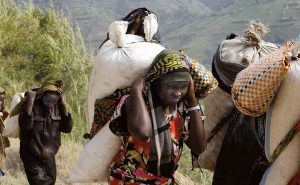
Today we are pleased to present the Women and Artisanal Mining research report conducted by our Congolese partners at Synergie des Femmes pour les Victimes des Violences Sexuelles (SFVS). The project, commissioned by ALBOAN for its Conflict-free Technology campaign, was made possible through financing from the Basque Government and the Provincial Council of Gipuzkoa.
We began working with SFVS almost four years ago as part of the campaign to expose the context in which conflict-related sexual violence in eastern Democratic Republic of the Congo (DRC) occurs and, above all, to try to address its causes. The driving forces behind the sexual violence in the region are multiple and complex, as is the reality of recent conflicts that have ravaged the country. However, efforts by Congolese organizations to change the situation have run up against an underlying issue which, while not at the root of the problem, stands in the way of its solution. This issue is the presence of enormous reserves of scarce minerals in the region, including coltan, tungsten, tin, gold and cobalt.
What should be an opportunity to improve people’s living conditions runs the risk of becoming the fuel that perpetuates the violence and corruption of political elites whose only interest is their own financial benefit. For years, transnational corporations, in their incessant search for cheap raw materials, have encouraged this corruption or have looked the other way. It is true that international pressures, local social movements and new trade legislations that promote the responsible supply of minerals have led to timid progress in the demilitarization and certification of artisanal mines in the eastern part of the country. However, the challenges are still enormous, as evidenced in a special report on the Spanish TV show Salvados, which aired roughly a year ago.
The Women and Artisanal Mining research report provides a more detailed diagnosis of the situation. For our Congolese partners, progress in the governance of the artisanal mining sector in eastern DRC falls short. There is still a lack of transparency and hardly any of the massive profits the mines produce reach the local population, while the costs of mining, on the other hand, literally fall on their backs. Men refuse to allow women to work in the mines, where salaries are higher, falsely claiming that international regulations prohibit it.
They have no issue, however, with allowing women to perform the hardest and most meticulous work as porters or in processing and washing minerals. Tasks that, in addition to being physically draining, pose serious health risks. When you add this back-breaking labor to the additional drawbacks related to “mining fever” like population explosions, the collapse of scarce public services and an increase in prostitution, it becomes easier to understand women’s experiences in eastern DRC.
Backed by these reasons, our partners at SFVS offer a number of recommendations to the local authorities in the research report, including the elaboration of a Rural Development Plan that serves to improve transparency, public services and, in short, the governability of the mining industry. They also demand that women’s voices be taken into account at all stages of the project, from design to implementation and follow-up. This, they affirm, is the only way to combat the gender inequalities in the region’s communities and ensure that women’s rights will be respected throughout this process.
You can view the full report in these links:
